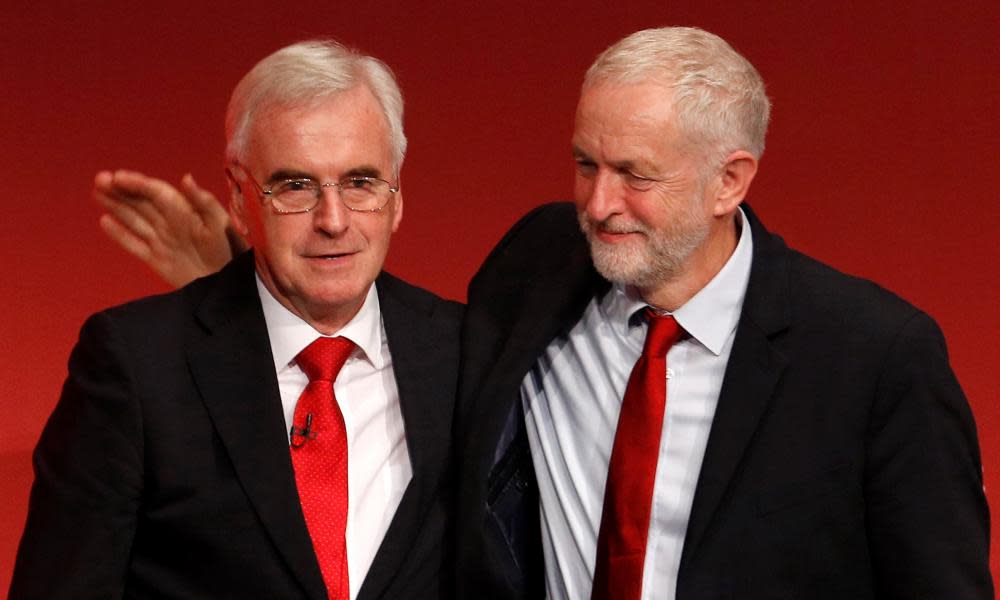Labour draws up plans for government in case of snap election

Labour is privately ramping up preparations for government, holding an away day on Monday where shadow cabinet members will present plans for a leftwing populist legislative programme so the party is ready for a snap general election.
The event in London will lay out plans for draft Queen’s speech of up to 35 bills and a budget intended to focus on living standards and workers’ rights.
Senior figures in the party such as the shadow chancellor, John McDonnell, have been consulting regularly with Gordon Brown to hone their plans and ensure Labour can act quickly in government.
They believe they can learn from the former prime minister. “We don’t want to repeat the mistake Brown made where he was only prepared for the first 100 days and then was faced with calls for an election,” a senior Labour source said.
Senior shadow ministers have been told they must turn up with six priority proposals, as well as having firm plans for legislation over the entire parliament. “We have to think much longer-term. But also we know we would be a new government that would come under attack like no other,” the source said.
The party is understood to be preparing for about 35 pieces of legislation to be ready to go should it win an election. Shadow ministers have been told the plans must be popular and radical. Proposals under consideration include abolishing zero-hours contracts, a mass housebuilding programme, nationalisation of key industries, consultations on possible rent control and lifting the public sector pay cap.
Sir Bob Kerslake, the former head of the civil service, has been meeting almost fortnightly with party advisers who have started preparing legislation and briefing party staff on how Whitehall operates. The party wants shadow cabinet members to know whom they would have the power to appoint on their first day in office and how civil service aides would be assigned.
Labour has taken the lead in the polls as voters digest Theresa May’s new Brexit policy, outlined at Chequers, in which she has proposed following EU rules for food and goods. This week a YouGov poll put Labour five points ahead of the Tories.
No general election is scheduled until 2022, but the febrile atmosphere in Westminster and the deep divisions in the Conservative party have fuelled speculation that May could be left with no choice but to call an early poll. Tory remainer rebels reported on Tuesday night that whips had threatened them with the spectre of a no-confidence vote in May and an early election should they vote in favour of a customs union amendment.
Most of the Labour candidates in marginal seats have been selected in preparation for any snap election, including Faiza Shaheen, the director of the Class thinktank, who will take on Iain Duncan Smith in Chingford and Woodford Green.
Some have already had to step aside either because of the demands of the role or an embarrassing revelation. Mandy Richards, selected in Worcester, was dropped after it was revealed she had made “false and vexatious claims” against MI5 and MI6 and a long list of others, including her GP and Thames Water.
Another candidate, Tara-Mary Lyons, was dropped after it emerged she had huge business debts that had not been disclosed to the party.
Privately, party sources acknowledge that a populist policy programme in the first Queen’s speech would be essential if the party found itself as a minority government.
“We’d put the policies forward, see who would vote for them, and then if we couldn’t get substantial legislation through, we’d have to go to the country again, but it would be for them [other parties] to explain why they wouldn’t back a national house-building programme,” a source said.

 Yahoo News
Yahoo News 
